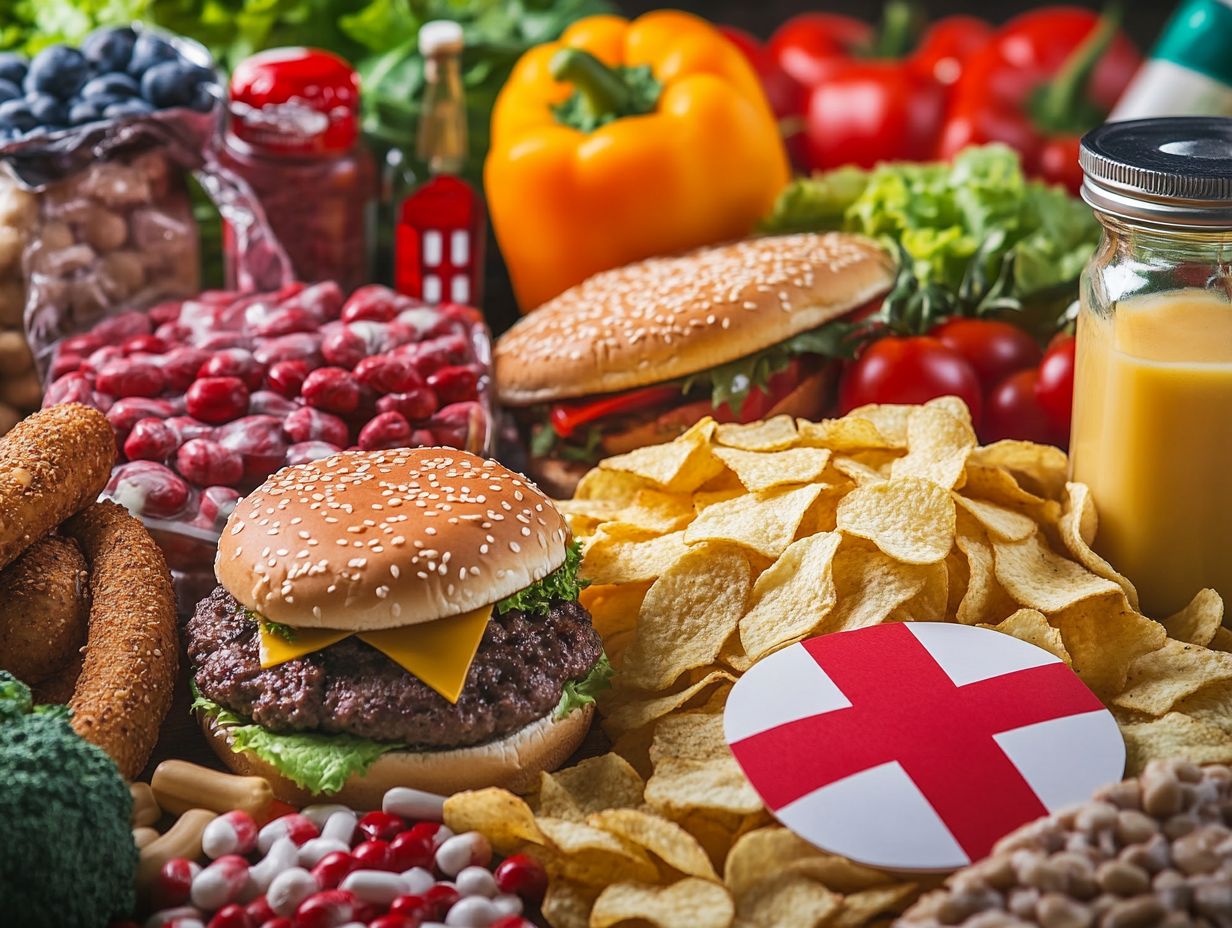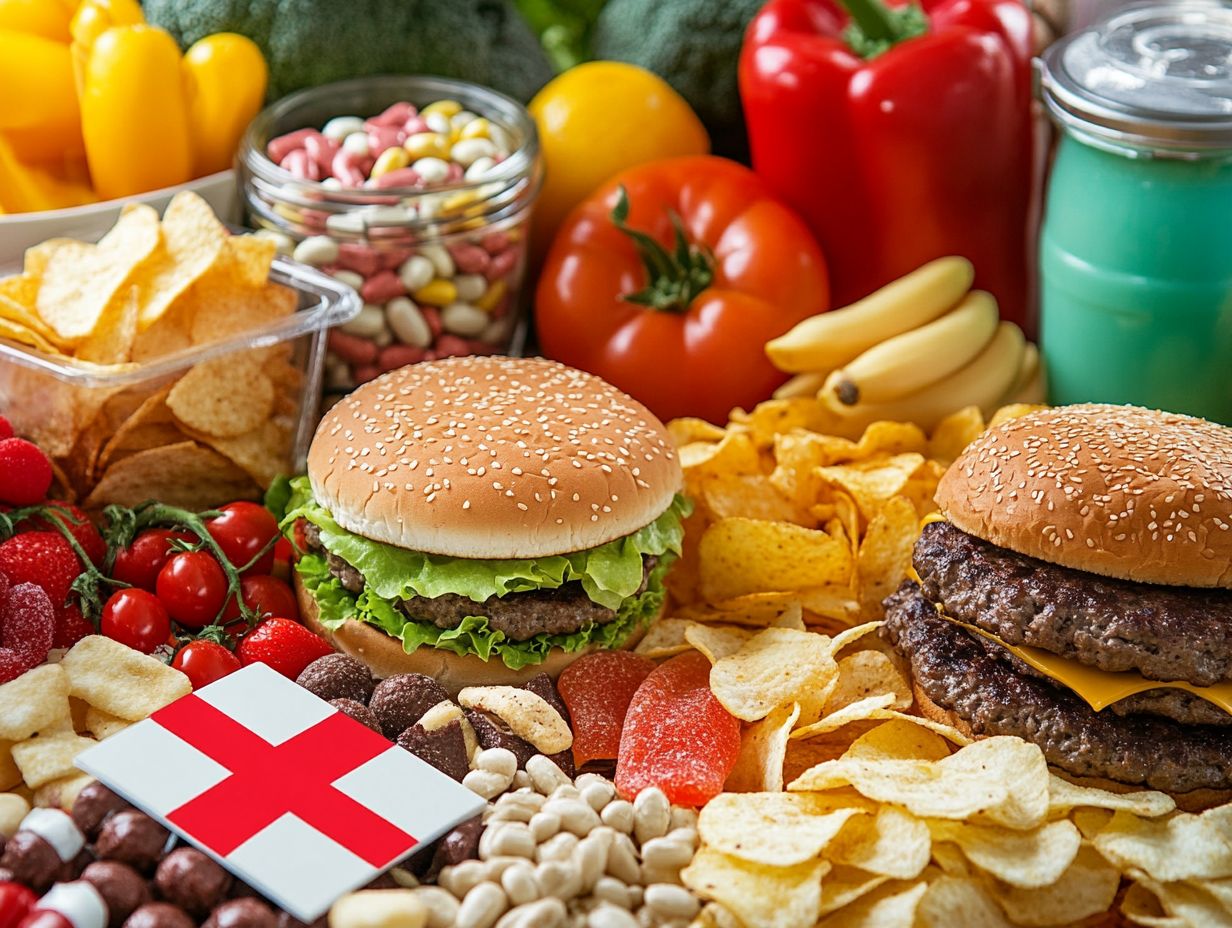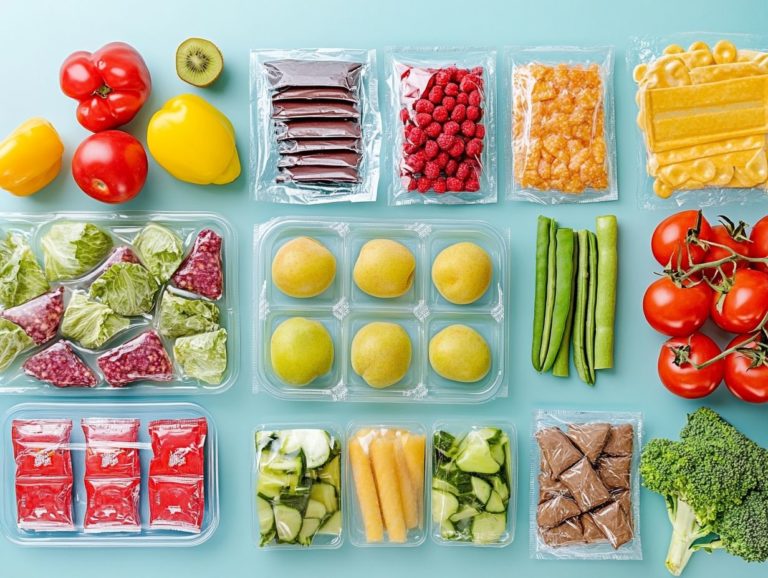What Foods Should I Avoid to Stay Healthy?
Eating well transcends mere trendiness; it s an essential pillar of good health.
By understanding what constitutes a healthy diet, you empower yourself to make informed food choices. This article delves into the key components of a nutritious diet, identifying foods you should limit or avoid while presenting healthier alternatives.
It also sheds light on the potential health risks tied to unhealthy eating habits and offers practical tips for sustainable dietary changes. Get ready to transform the way you think about food!
Contents
- Key Takeaways:
- Understanding a Healthy Diet
- Foods to Limit or Avoid
- Alternatives to Unhealthy Foods
- Impact of Unhealthy Foods on Health
- Tips for Maintaining a Healthy Diet
- Frequently Asked Questions
- What Foods Should I Avoid to Stay Healthy?
- What are processed foods and why should I avoid them?
- Why should I limit my intake of sugary beverages?
- What are trans fats and why should I avoid them?
- Is it necessary to completely avoid fast food?
- How can I reduce my intake of unhealthy snacks?
- What can I substitute for unhealthy foods in my diet?
Key Takeaways:

Avoid processed and high-fat foods, such as fast food and fried items, to maintain a healthy diet.
Limit your consumption of sugary and high-sodium foods, such as candy and chips, to improve overall health and reduce the risk of chronic diseases.
Choose nutritious alternatives to unhealthy foods, such as swapping soda for water or opting for whole grain options instead of refined carbohydrates.
Understanding a Healthy Diet
Understanding the importance of a healthy diet is essential for achieving long-term well-being and preventing health issues like obesity, diabetes, and cardiovascular disease.
A balanced diet includes a variety of foods that deliver essential nutrients and promote heart health. It also helps you manage sodium intake while avoiding unhealthy options like processed meats and sugary drinks.
Make it a priority to incorporate whole grains, legumes, fruits, and vegetables into your daily meals. This is key to achieving overall health.
Key Components of a Healthy Diet
The key components of a healthy diet encompass a balanced intake of whole grains, fruits, vegetables, legumes, and healthy fats, all of which elevate your heart health and overall well-being.
Whole grains truly shine with their wealth of essential nutrients and fiber. They play a pivotal role in lowering cholesterol levels and reducing the risk of heart disease.
Foods such as quinoa, brown rice, and oats deliver sustained energy and promote digestive health.
When you pair whole grains with a vibrant array of fruits and vegetables, you enhance your intake of antioxidants, which help protect your body from inflammation.
Legumes like lentils and chickpeas serve as excellent sources of plant-based protein and fiber. They help you maintain a healthy weight and keep your blood pressure in check.
Emphasizing healthy fats, especially from sources like avocados and nuts, provides nourishment for your heart. Adopting a plant-based diet is a combined approach to achieving optimal cardiovascular health, ensuring you thrive in both body and spirit.
Foods to Limit or Avoid
In your journey toward a healthier lifestyle, it s crucial to pinpoint and limit or even eliminate foods that could undermine your well-being. Steer clear of unhealthy options laden with added sugars, trans fats, and excessive sodium.
Processed meats and junk food are particularly notorious for fostering chronic health issues, such as obesity and heart disease. By acknowledging the harmful effects of refined carbohydrates and unhealthy fats, you can take charge of your diet and make informed dietary choices.
Processed and High-Fat Foods
Processed and high-fat foods, especially those laden with trans fats and excessive saturated fats, can greatly elevate your risk of heart disease and contribute to unwanted weight gain.
These tempting foods, often found in fast food, commercially baked goods, and ready-to-eat meals, lure many in with their convenience and irresistible flavors. However, regular indulgence in such items can lead to nutritional deficiencies, robbing your body of vital vitamins and minerals.
You may find yourself grappling with various health issues, including elevated cholesterol levels and high blood pressure, which can set the stage for serious cardiovascular complications.
Recognizing the importance of reading food labels is essential, as it allows you to pinpoint harmful ingredients like partially hydrogenated oils and added sugars. This knowledge gives you the power to make healthier choices that contribute to your overall well-being.
Start today by swapping one unhealthy food for a healthier option!
Sugary and High-Sodium Foods

Sugary foods and drinks can lead to health issues. They often cause too much sugar intake, which harms cardiovascular health and raises hypertension risk.
Nearly 70% of adults are overweight or obese, conditions linked to diabetes and heart disease.
A diet high in sodium can also increase blood pressure, affecting one in three adults.
Swap sugary snacks for fresh fruits for natural sweetness without side effects. When cravings hit, try air-popped popcorn or mixed nuts in moderation instead of chips.
Alternatives to Unhealthy Foods
Embracing nutritious substitutions is a crucial stride in nurturing a healthy diet. You can easily achieve this by swapping unhealthy foods for wholesome alternatives like:
- Whole grains
- Vibrant fruits
- Crisp vegetables
- Hearty legumes
- Satisfying nuts
Nutritious Substitutions
Nutritious substitutions offer a powerful approach to elevating your dietary quality. Replace unhealthy foods with wholesome grains, legumes, fruits, and vegetables that foster better health.
By choosing quinoa or brown rice over white rice, you significantly boost your fiber intake and enhance digestion. Legumes like lentils and chickpeas are fantastic protein sources and can replace meat in many meals, helping you cut saturated fats.
For a delicious dish, imagine a hearty vegetable stir-fry with vibrant bell peppers, broccoli, and carrots, served over farro or barley. These plant-based choices elevate your meals and provide essential vitamins and minerals.
Impact of Unhealthy Foods on Health
Unhealthy foods can significantly impact your health, potentially leading to serious risks like heart disease, obesity, diabetes, and various cardiovascular conditions.
It s essential to recognize how your dietary choices influence your overall well-being.
Health Risks and Consequences
Consuming unhealthy foods raises the likelihood of developing heart disease, obesity, diabetes, and hypertension. These conditions critically affect cardiovascular health.
Such issues stem from poor dietary choices, leading to nutrient imbalances, excessive calorie consumption, and too much sugar and unhealthy fats.
Over time, bad habits can trigger inflammation and insulin resistance, setting the stage for chronic illnesses. To mitigate these risks, embrace preventive measures by incorporating more whole foods into your diet.
- Focus on fruits, vegetables, and lean proteins while limiting processed foods and sugary drinks.
Engaging in regular physical activity enhances metabolic health and supports effective weight management. Take these steps to contribute to your overall well-being!
Tips for Maintaining a Healthy Diet

Implementing strategies for maintaining a healthy diet is crucial for reaching your nutritional goals. You can achieve this through sustainable changes that foster a balanced diet and encourage positive dietary habits.
How to Make Sustainable Changes
Making sustainable changes to your diet means setting realistic goals. Embrace a balanced approach that you can maintain long-term.
To manage your diet easily, it s essential to introduce gradual dietary adjustments rather than making abrupt shifts that might feel overwhelming. Consistency is key in reinforcing these changes and cultivating lasting habits.
Meal planning helps you structure your week. It ensures you incorporate a variety of food groups while keeping monotony at bay. By preparing meals in advance, you ll save time and reduce the temptation to stray from your goals on busy days.
Expect setbacks; they’re part of the journey! Focus on your goals and learn from each experience. This approach will foster resilience and strengthen your commitment to healthier living.
Frequently Asked Questions
What Foods Should I Avoid to Stay Healthy?
The foods you eat directly affect your overall health and well-being. By avoiding certain foods, you can improve your health and reduce your risk of developing chronic diseases. Here are some frequently asked questions about the foods you should avoid to stay healthy.
What are processed foods and why should I avoid them?
Processed foods are items altered from their natural state, often through methods like canning, freezing, or adding preservatives. These foods are typically high in sugar, sodium, and unhealthy fats, contributing to health problems such as obesity, heart disease, and diabetes. It’s best to limit your intake of processed foods and opt for whole, unprocessed foods instead.
Why should I limit my intake of sugary beverages?

Sugary beverages, such as soda, energy drinks, and sweetened fruit juices, are high in calories and sugar but offer little nutritional value. Consuming too many sugary beverages can lead to weight gain, tooth decay, and an increased risk of developing type 2 diabetes. To stay healthy, it’s best to limit your intake of these beverages and choose water or unsweetened tea instead.
What are trans fats and why should I avoid them?
Trans fats are a type of unhealthy fat commonly found in processed and fried foods. These fats have been linked to an increased risk of heart disease, stroke, and type 2 diabetes. It’s important to check food labels and avoid foods that contain trans fats. Opt for healthier fats, such as those found in avocados, olive oil, and nuts.
Is it necessary to completely avoid fast food?
While it’s best to limit your intake of fast food, it’s not necessary to completely avoid it. Fast food is often high in calories, unhealthy fats, and sodium, which can contribute to health problems if consumed in excess. However, if you choose to eat fast food, opt for healthier options like salads, grilled chicken sandwiches, and water instead of soda.
How can I reduce my intake of unhealthy snacks?
Unhealthy snacks, such as chips, cookies, and candy, are often high in calories, sugar, and unhealthy fats. To avoid these snacks and stay healthy, it’s important to plan ahead and have healthier options available. Stock your pantry with fruits, vegetables, nuts, and other nutritious snacks so that you’re less likely to reach for unhealthy ones.
What can I substitute for unhealthy foods in my diet?
There are many healthy substitutes for unhealthy foods that can help you maintain a balanced and nutritious diet. Instead of sugary cereals, opt for oatmeal topped with fresh fruit. Replace white rice with brown rice or quinoa. Choose whole grain bread instead of white bread. By making these simple substitutions, you can avoid unhealthy foods and improve your overall health.
Start making small changes today for a healthier tomorrow!






